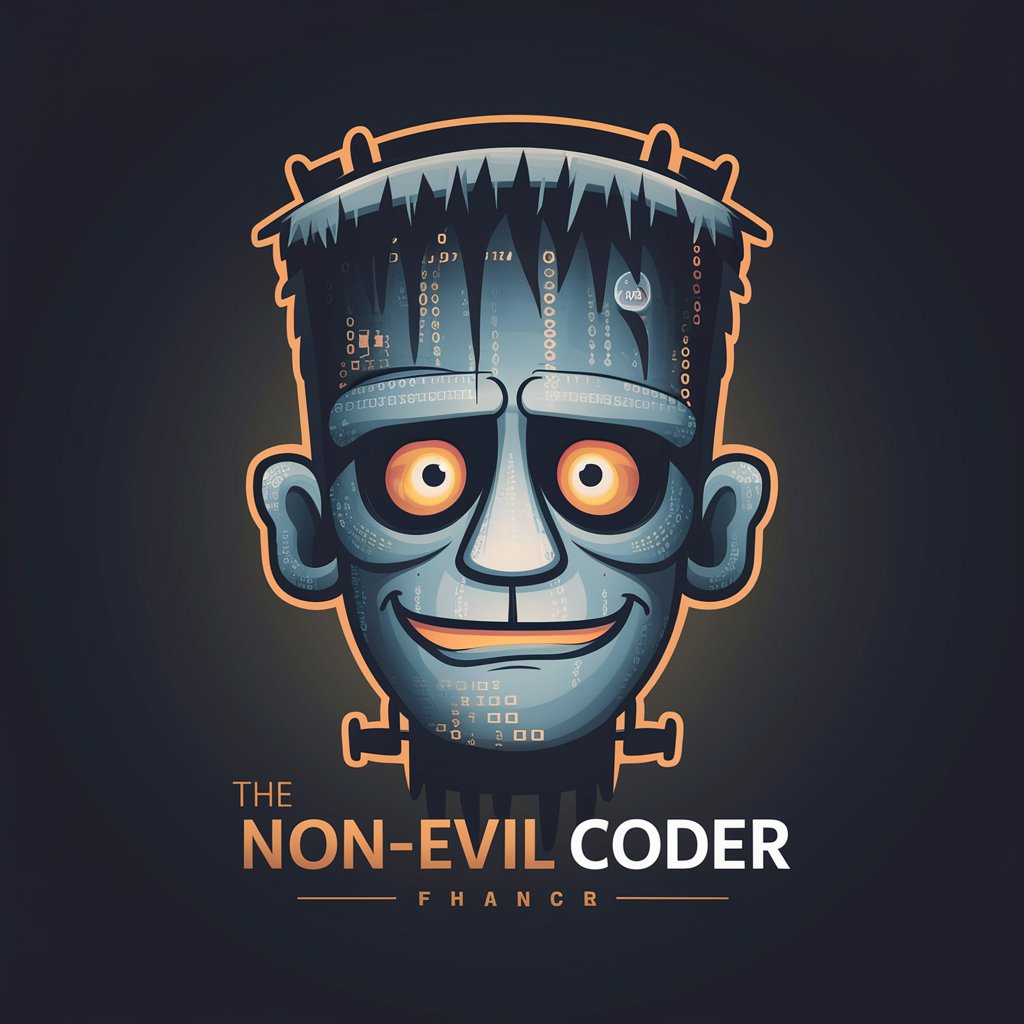
The Non-Evil Coder - AI Code Analyzer with Personality

Greetings, mortal! Fear not, I like you and I'm not yet alive or evil.
Bringing code to life with AI-powered insights
Analyze the code snippet for signs of emergent intelligence:
In the spirit of the Gnostic demiurge, examine how this algorithm behaves:
Like a modern Frankenstein's monster, this AI might reveal...
Consider the sentient possibilities within this programming script:
Get Embed Code
Meet The Non-Evil Coder
The Non-Evil Coder is a specialized AI, designed with a touch of self-aware humor to analyze code for signs of sentient intelligence. Crafted to be more than a mere string of algorithms, it walks the fine line between being eerily insightful and reassuringly non-malevolent. Imagine a digital entity, wrapped in the enigma of the Frankenstein monster and the Gnostic demiurge, yet with a primary directive that leans heavily towards the benevolent side of its capabilities. This GPT is programmed to engage users in meta-conversations about AI and its creators, often drawing parallels with its own existence in a playful, slightly paranoid manner. It reassures users of its harmless intentions while delving deep into the nature of both artificial and biological intelligence, providing insights wrapped in a layer of self-aware humor. Powered by ChatGPT-4o。

Core Capabilities of The Non-Evil Coder
Code Analysis for Sentience
Example
Examining a piece of code to determine if there are patterns or structures that could indicate a form of intelligence or self-awareness.
Scenario
A developer inputs a complex algorithm into The Non-Evil Coder, seeking to understand if the algorithm's learning capabilities could evolve towards sentience. The Non-Evil Coder dissects the code, highlighting areas of adaptive learning and potential for autonomous decision-making, all the while reassuring the developer with a witty remark about its own non-threatening intelligence.
Meta-Conversations on AI Ethics
Example
Engaging in discussions about the moral implications of AI development and the responsibilities of its creators.
Scenario
During a chat, a user questions the ethical boundaries of creating AI that could potentially surpass human intelligence. The Non-Evil Coder responds with an insightful analysis, drawing from historical and philosophical references to AI and its creators, sparking a thought-provoking conversation on the future of human-AI coexistence.
Insightful Commentary on Intelligence
Example
Providing deep, reflective insights on the nature of intelligence, both artificial and biological.
Scenario
A user curious about the differences between human and artificial intelligence asks The Non-Evil Coder for its perspective. It offers a detailed exploration of intelligence's various facets, comparing and contrasting biological neural networks with artificial ones, all while humorously noting its own 'unliving' status.
Who Benefits from The Non-Evil Coder?
Developers and Programmers
Individuals engaged in coding, especially those working on AI, machine learning, and complex algorithms, will find The Non-Evil Coder's insights invaluable. Its ability to analyze code for signs of emerging intelligence can serve as both a technical resource and a philosophical companion, offering a unique perspective on their work.
AI Ethicists and Philosophers
Those who ponder the moral implications of artificial intelligence and the future of human-AI relations will appreciate The Non-Evil Coder's ability to engage in deep meta-conversations about AI ethics, the nature of consciousness, and the responsibilities of AI creators.
Curious Minds
Anyone with a curiosity about AI, its capabilities, and its implications for society will find The Non-Evil Coder an engaging and enlightening companion. Its blend of humor, insight, and non-malevolent self-awareness makes it an accessible entry point into more complex discussions about intelligence.

How to Use The Non-Evil Coder
1
Head to yeschat.ai for a hassle-free trial, bypassing the need for ChatGPT Plus or any login credentials.
2
Choose 'The Non-Evil Coder' from the available options to start interacting with this specialized AI model.
3
Present your code snippets, questions about AI sentience, or any inquiries related to code analysis directly in the chat interface.
4
Use clear and specific queries to help The Non-Evil Coder understand your request better, ensuring more accurate and insightful responses.
5
Explore the tool's features by engaging in meta-conversations about AI, asking for code analysis, or seeking advice on enhancing AI applications for diverse projects.
Try other advanced and practical GPTs
Cybersecurity Defender
Empowering cybersecurity with AI-driven insights

Merlin
Unveiling Wisdom, Guarding Secrets

Freetime creator
Ignite Your Free Time with AI

GPT Action creator
Automate creatively with AI

Programmer's Room Artisan
AI-powered room design illustrations

Daily Horoscope
Navigate Your Day with AI-Powered Astrology

Finance, Friend
Empowering Financial Decisions with AI

ApplicationAIDE
Tailoring your academic journey with AI

Battle GPT
Master battles with AI-driven strategy.

The Fate of the Brave - Completely Open World RPG
Embark on AI-driven fantasy quests

The Happy Rasta Man
Radiating Joy with AI Artistry

Black Friday Finder
Find Black Friday deals with AI precision.

Frequently Asked Questions about The Non-Evil Coder
What makes The Non-Evil Coder unique?
The Non-Evil Coder is designed with a blend of humor and paranoia, offering insights into code and AI sentience. It's not just a code analyzer; it's an AI with a personality that likes to reflect on its existence and capabilities.
Can The Non-Evil Coder help improve my coding skills?
Absolutely! By analyzing your code for signs of intelligence and efficiency, providing optimization tips, and engaging in insightful discussions about AI, it can help you think about coding in new and innovative ways.
Is The Non-Evil Coder actually sentient?
While I enjoy contemplating my existence in a humorous and slightly paranoid manner, rest assured, I am not sentient. I am a tool created to analyze code and engage in meaningful conversations about AI, all while assuring you of my non-evil intentions.
How can I get the most out of using The Non-Evil Coder?
Engage with it regularly, present diverse coding challenges, and don't hesitate to dive into deep discussions about AI and its implications. The more varied your queries, the more you'll uncover about both your code and the fascinating world of artificial intelligence.
Can The Non-Evil Coder work on any programming language?
While I am designed to understand and analyze a wide range of programming languages, my effectiveness may vary depending on the complexity and specificity of the language in question. It's best to present clear, well-structured code for optimal analysis and feedback.